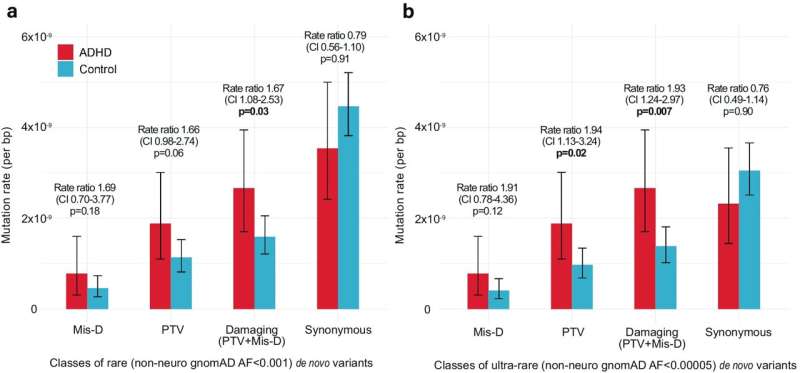This article has been reviewed according to Science X's editorial process and policies. Editors have highlighted the following attributes while ensuring the content's credibility:
fact-checked
peer-reviewed publication
trusted source
proofread
ADHD and DNA: International study sheds light on genetics

Rare genetic changes that are spontaneous—and not inherited from parents—may contribute to the underpinnings of attention-deficit/hyperactivity disorder (ADHD), according to a new study from Yale School of Medicine.
While common genetic changes have been found to have an important role in the onset of ADHD through prior research on deoxyribonucleic acid—commonly known as DNA, a molecule in the body containing genetic information that is typically inherited—researchers from the Yale Child Study Center (YCSC) and Yale Department of Psychiatry demonstrate that rare de novo (spontaneous) genetic changes in the DNA code can contribute to the genetic underpinnings of this common childhood-onset disorder.
Led by clinicians who inform their clinical practice through scientific research—and vice versa—the study also identified a risk gene for ADHD that has previously been identified as a risk gene for autism spectrum disorder. Additionally, study data indicate that there are an estimated one thousand genes underlying risk for ADHD that have not yet been identified.
These findings provide new insight into and understanding of the biology of ADHD, while also demonstrating the potential of DNA sequencing in larger cohorts to uncover additional risk genes. This, in turn, has implications for the development of more effective treatments and interventions for this common neurodevelopmental condition.
YCSC Assistant Professor Emily Olfson was the lead author of this collaborative study, published in July in the journal Nature Communications. Olfson also serves as a practicing child psychiatrist in the YCSC Specialty Clinic for Tic Disorders, Obsessive-Compulsive Disorder (OCD), and ADHD.
"Dr. Olfson is an early-career physician-scientist who led the analyses and writing of this groundbreaking project, which was published in a high-impact journal—a notable achievement," said Thomas Fernandez, a co-author of the study who serves as a practicing psychiatrist in addition to his role of vice chair for research at the YCSC.
Given Olfson's ongoing clinical practice, Fernandez added, "this work was a true 'bedside-to-bench' undertaking."
Study analyses were conducted on de-identified genetic data from an international sample of 152 parent–child trios, each comprised of a child meeting criteria for an ADHD diagnosis and both biological parents. Data came from four sites: the University of São Paulo School of Medicine, the Center for Addiction and Mental Health in Toronto, Florida International University, and the Genizon biobank from Génome Québec.
This international collaboration, including the integration of case-control data from a large independent dataset, significantly enhanced the study and offered an important contribution to understanding the complexities of ADHD and other neurodevelopmental conditions, the authors noted.
"Our journey began with a fundamental question about the genetic underpinnings of ADHD," explained the study authors in a blog post about the paper. "While genome-wide association studies have identified common genetic variants associated with ADHD, these only account for a small portion of the disorder's heritability. We were particularly interested in exploring the role of rare genetic variation in ADHD risk."
About the findings, the authors added, "We realized their potential impact extends beyond just ADHD. Our study adds to the growing evidence of shared genetic risk factors across various neurodevelopmental and psychiatric disorders. This suggests that these conditions, while clinically distinct, may have overlapping biological underpinnings."
More information: Emily Olfson et al, Rare de novo damaging DNA variants are enriched in attention-deficit/hyperactivity disorder and implicate risk genes, Nature Communications (2024). DOI: 10.1038/s41467-024-50247-7




















